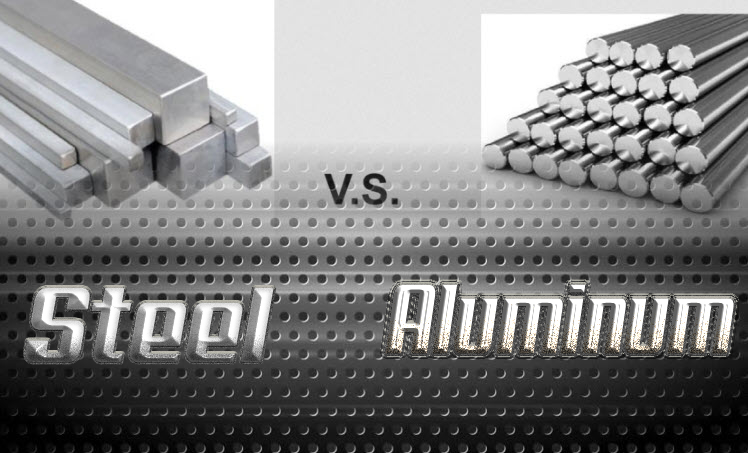Two of the most highly utilized materials on Earth are steel, a carbon-iron alloy, and aluminum, a metallic element. These metals are useful, especially within industrial applications. Aluminum’s silvery-white appearance and lightweight properties compared with steel’s high tensile strength and low-cost qualities are just a few of their many distinctions, allowing for a wide span of differences when it comes to applications in the industrial spectrum.
How Aluminum and Steel Can Be Beneficial
Apart from being 100% non-toxic and recyclable, Aluminum’s properties make for a non-combustible, non-sparking, and non-magnetic material that’s generally painless to work with. Its ease of fabrication combined with its flexible nature gives aluminum handlers the ability to produce precise, close tolerances with superb design freedom and cost-effective production. Additionally, aluminum is corrosion-resistant, resilient, and exhibits increased strength in colder environments.

Steel has an enormous strength-to-weight ratio, and weighs 60% less than concrete, allowing for easier transportation and making various processes of construction and fabrication much faster. Additionally, steel is an eco-friendly option among alloys and metals, as it is recyclable.
Applications
Aluminum
Transportation
Modern aircraft use aluminum all throughout. Spacecrafts contain 50 to 90% aluminum alloys. Not the toughest metal, the motivation to increase fuel efficiency makes aluminum, with its lightweight nature, highly sought-after in the automotive industry.
Construction– Modern Designs
Aluminum’s tendency to be extremely malleable into intricate shapes make it a necessity for modern architects and allows freedom otherwise unable to be attained with materials such as wood or steel. High-rise buildings typically use aluminum, and its strength-to-weight ratio proves to be a speedy benefit during construction. Aluminum stairs are well-praised, with its rust-resistant characteristics.
Packaging & Consumer Goods
Aluminum is a bestseller with consumer products, with its non-toxic properties making it perfect for packaged beverages, medications, and foods. Aluminum is fundamental for electronics, with many of our smartphones, laptops, and televisions employing the use of the metal.
Electrical
With its low density and non-corrosive properties, aluminum has quickly been replacing copper as an improved option for long-distance power lines – the ductility also allows it to be formed into wires more easily. Aluminum is also used in LED bulbs, television antennas, and satellite dishes.
Steel
Construction – The Bones
Steel’s strength makes it a go-to for the construction industry. Steel is a staple of railways, roads, buildings and other infrastructures. Modern, strong structures like stadiums, airports, and skyscrapers opt for a durable steel frame system or steel skeleton.
Energy
Energy outlets such as nuclear, natural gas, wind power, and electric all need steel framework. Steel is used for resource extraction and bulky operational devices like forklifts and cranes, and the strength of steel is required for offshore platforms. Steel can also be found in energy regions such as transmission towers, transformer cores, electromagnetic shields, and more.
Miscellaneous Uses
All in all, the practicality of steel and aluminum spans far and wide. While aluminum is the most abundant metal on earth, steel is the favorite alloy.
Over half of the weight of your fridge, oven, washing machine and many other household appliances come from steel. Other applications are strong metal stairs and construction materials such as nails or screws, and practical uses such as sculptures and framing.
The Faceoff
Aluminum’s precision, lightweight properties, and adaptability to harsh conditions make it most suitable for aerospace, consumer products and industries wanting a lightweight option without sacrificing strength.
Steel’s raw power, lower prices, and impressive strength make it the best option for load-bearing projects, and a leader in the construction, automotive and tooling industry.